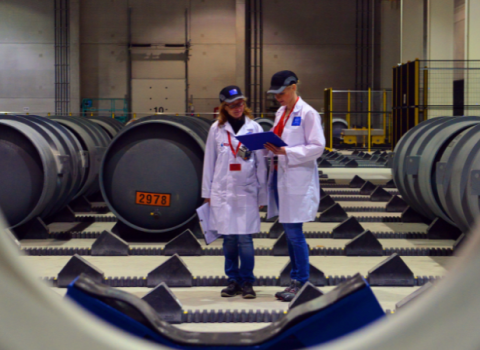TU Delft has joined industrial partners RWE Offshore Wind, Eneco, TenneT, Ballast Nedam, Van Oord, IHC Mer-wede, 2-B Energy, XEMC Darwind, and ECN, in a large-scale innovation programme for the development of a pioneering large-scale remote offshore wind energy farm. The plan for FLOW, the Far and Large Offshore Wind, project has been presented to the Minister of Economic Affairs Van der Hoeven.
The plan comprises both an R&D programme and a demonstration wind farm to be established far off the Dutch coast. There are currently no wind farms operating at this depth and distance from the coast anywhere in the world. The FLOW programme is designed to enable companies in the Netherlands to take a leading position in the European market for offshore wind farms. The initiative will serve to accelerate the Dutch government’s ambition to install wind farms with a capacity of 6,000 MW by 2020.
FLOW brings together turbine manufacturers, offshore contractors, investors in and developers of wind farms, research institutions and the national electricity carrier. The new technologies being developed will be tested and demonstrated in a wind farm with a capacity of 100 to 300 MW (20 to 60 turbines).
Dirk Jan van den Berg, President of the TU Delft Executive Board, said, “Through this unique partnership between public and private parties, the requisite knowledge will be developed to accelerate the installation of wind farms far out at sea. For the government, this is a unique opportunity to develop the Dutch value chain and create sustainable employment.”
The Dutch government has set a target of generating 6,000 MW of offshore wind energy capacity by 2020, representing 38 percent of the total renewable electricity harvested in the Netherlands. The FLOW demonstration wind farm is expected to meet the annual electricity needs of 100,000 to 300,000 households, leading to a reduction of 180,000 to 550,000 tons of CO2 per year.
Around the world there is little knowledge of, and experience with, wind farms located far off the coast. The FLOW consortium will jointly carry out research, develop new foundation concepts and devise new operational and maintenance strategies, and study wind conditions. More efficient turbines are being designed that are specifically intended for use at locations in the North Sea. In addition, new installation technologies for wind farms at these depths and distances from the coast will be developed.
The partners are also conducting research into the best technology for connecting to the electricity grid. New concepts will be validated, from design to utilisation, in the demonstration wind farm. The lessons learned will be commercialised in future large-scale investments in offshore wind farms and will accelerate these investments. “FLOW will make a major contribution to increasing the reliability of large-scale wind farms while reducing the costs and risks,” said Huib Morelisse, CEO of RWE Netherlands.





 A unique international forum for public research organisations and companies to connect their external engagement with strategic interests around their R&D system.
A unique international forum for public research organisations and companies to connect their external engagement with strategic interests around their R&D system.